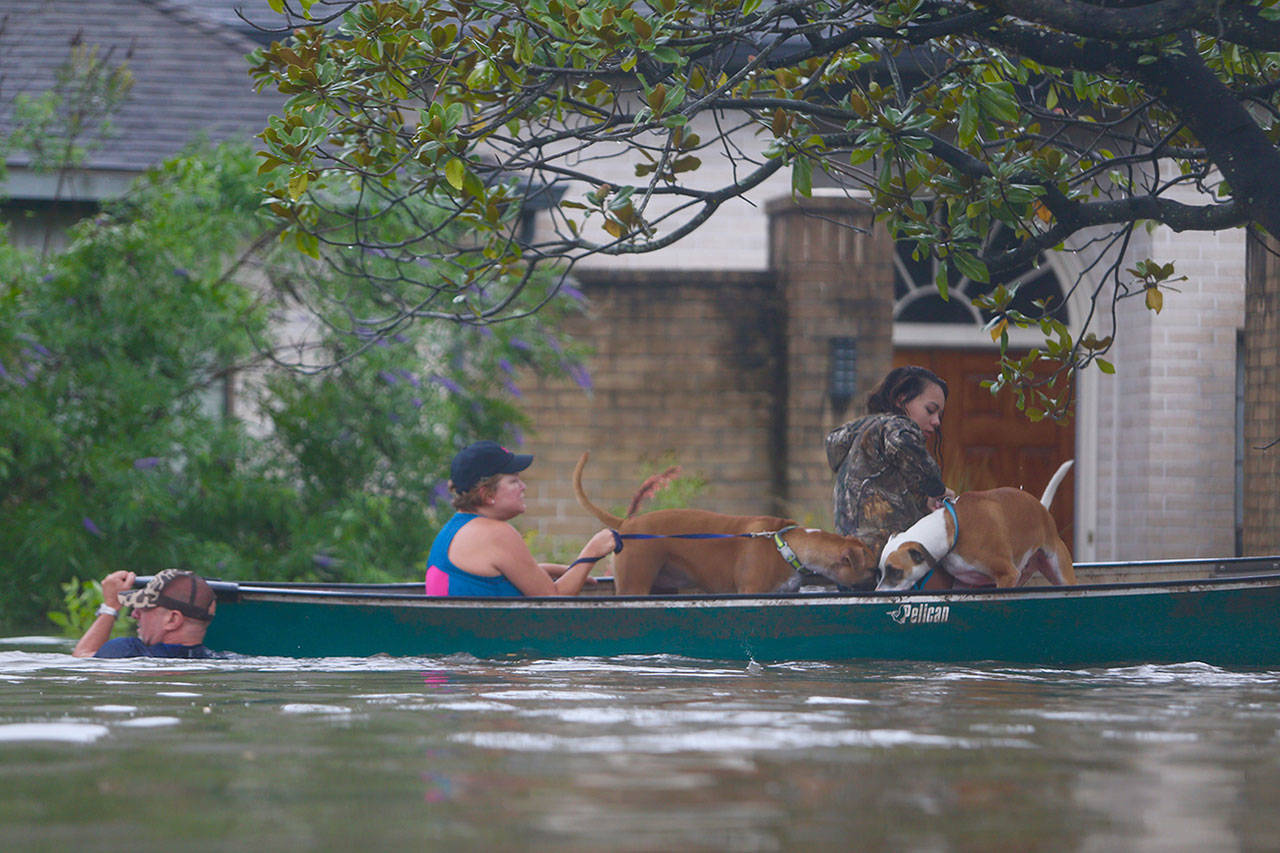By The Herald Editorial Board
The images and stories from the greater Houston area following Hurricane Harvey tear at and touch the heart at the same time: Photos and video of homes inundated by floodwater, tents pitched atop roofs and roads and highways turned into canals are then followed by images of first-responders ferrying families to higher ground and neighbors wading through hip-deep waters, carrying children and pets.
We’ve seen that willingness to respond from emergency workers and neighbors in our own communities following apartment fires, floods and landslides. That desire to help isn’t diminished by distance, and fortunately there are many charities and methods for extending a hand to those in need.
That need is likely to continue to grow during a disaster that came ashore late last week, built through the weekend and continues to hit southeast Texas and is now moving east into Louisiana. In the Houston area alone, thousands are now in shelters and as many as 30,000 may need shelter from flooded homes before waters begin to recede.
Mercifully, few deaths have resulted but the looming financial loss and disruption to lives makes this one of the worst natural disasters ever for Texas and the nation.
As we begin to reach for credit cards and checkbooks, take a moment to make sure your donation does the greatest good and stays out of the hands of those who would take advantage of the misfortune of others and your generosity.
Some tips on giving:
Unless an organization requests specific material goods, it’s better to make a financial donation, which can be used quickly for the most immediate needs. Donated material requires transporation and storage, both of which are complicated by the flooding in and around Houston.
Avoid personal solicitations or those telling you they are collecting to give to a charity. Direct donations to organizations are the best way to make sure your gift goes where you intend.
One quick and simple way to give to the American Red Cross is to text “HARVEY” to 90999 or to The Salvation Army by texting “STORM” to 51555. A $10 donation will be added to your phone bill for each text. Other groups offer donations by text, but donors should verify the organization’s contact information before texting and check into the backgrounds of organizations they are not familiar with.
One of the best sources for help in selecting a relief organizationfor your gift is the Charity Navigator website.
Charity Navigator, a nonprofit itself, is the nation’s largest and most-utilized evaluator of charities and nonprofit organizations, rating more than 8,000 groups on their accountability and financial practices, including how much of a group’s funding goes to its programs and how much to administration and fundraising costs.
Charity Navigator has a page dedicated to Hurricane Harvey and a list of organizations taking donations for disaster relief, including links to its reports and to the organizations’ websites. Among the charities included on the page are American Red Cross, International Relief Teams, Catholic Charities of the Archdiocese of Galveston-Houston and Americares. Although not listed on its Harvey page, the Houston Food Bank is worthy of consideration and has a perfect score of 100 from Charity Navigator.
This is also a good opportunity to spend some political capital by contacting members of Congress.
As relief work is just starting in Texas and Louisiana, a political storm in Washington, D.C. threatens an effective response to Harvey and disasters that follow midway through hurricane season.
All before the end of September, Congress and President Trump must avoid a partial government shutdown by at least passing a continuing resolution to keep many government operations funded. At the same time, the federal government must raise its debt ceiling limit to allow the government flexibility to send emergency relief to affected areas. Likewise, federal authorization for the National Flood Insurance Program, which is already more than $24 billion in debt, expires by Sept. 30.
Recent political sniping between the president and Congress only adds to the possibility for inaction and a blunted response.
To President Trump’s credit, he nominated as chief administrator of the Federal Emergency Management Agency, William “Brock” Long, who previously was a regional manager with FEMA during the George W. Bush administration and then served as Alabama’s emergency management director.
But at the start of the year, the president proposed a budget that seeks to cut 11 percent from FEMA, which would hamper the agency’s ability to respond to disasters such as Harvey. More recently, Trump has threatened to allow a partial government shutdown to goad congressional approval for funding for his border wall proposal, again jeopardizing the federal response to disasters.
Congress and Trump, who is scheduled to visit Texas today, should be encouraged to do what we see neighbors doing in Houston: putting aside any differences, wading into difficult situations and helping those in need.
Talk to us
> Give us your news tips.
> Send us a letter to the editor.
> More Herald contact information.

























